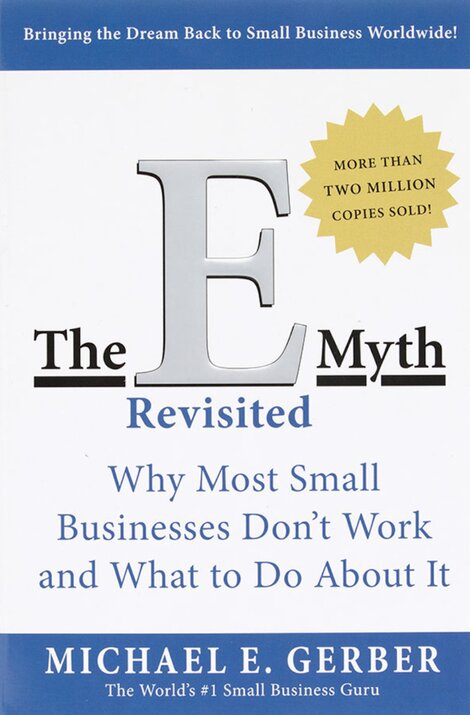In The E-Myth Revisited Rev Ed: Why Most Small Businesses Don’t Work and What to Do About It, American author and founder of E-Myth Worldwide, Michael E. Gerber, introduces the concept of E-Myth (The Entrepreneurial Myth), which is the false belief that small businesses are started by entrepreneurs, when, in fact, most are not. Gerber highlights how common assumptions, expectations, and even technical expertise can get in the way of running a successful business.
The E-Myth Revisited Book is based on four ideas:
IDEA #1: E-Myth (The Entrepreneurial Myth)
It is rooted in a romantic belief that small businesses are started by entrepreneurs, when, in fact, most are not. E-Myth—which says that small businesses are started by entrepreneurs risking capital to make a profit. This is simply not so. The real reasons people start businesses have little to do with entrepreneurship.
In fact, this belief in the Entrepreneurial Myth is the most important factor in the devastating rate of small business failure today. Understanding the E-Myth, and applying that understanding to the creation and development of a small business, can be the secret to any business’s success.
IDEA #2: The Turn-Key Revolution.
Not only is it changing the way we do business in this country and throughout the world but it is changing who goes into business, how they do it, and the likelihood of their survival.
IDEA #3: Business Development Process.
At the heart of the Turn-Key Revolution is a dynamic process called the Business Development Process. When a small business ignores this process—as most unfortunately do—it commits itself to Management by Luck, stagnation, and, ultimately, failure. The consequences are inevitable.
IDEA #4
The Business Development Process can be systematically applied by any small business owner in a step-by-step method that incorporates the lessons of the Turn-Key Devolution into the operation of that business. This process then becomes a predictable way to produce results and vitality in any small business whose owner is willing to give it the time and attention it requires to flourish.
The Entrepreneurial Seizure.
It could have been anything; it doesn’t matter what. But one day, for apparently no reason, you were suddenly stricken with an Entrepreneurial Seizure. And from that day on your life was never to be the same.
Inside your mind, it sounded something like this: “What am I doing this for? Why am I working for this guy? Hell, I know as much about this business as he does. If it weren’t for me, he wouldn’t have a business. Any dummy can run a business. I’m working for one.”
The Fatal Assumption
if you understand the technical work of a business, you understand a business that does that technical work. In fact, it’s the root cause of most small business failures! The technical work of a business and a business that does that technical work are two totally different things!
The Entrepreneur, The Manager and The Technician
The Entrepreneur
The entrepreneurial personality turns the most trivial condition into an exceptional opportunity.
The Entrepreneur is the visionary in us. The dreamer. The energy behind every human activity. The imagination that sparks the fire of the future. The catalyst for change. The Entrepreneur lives in the future, never in the past, rarely in the present. He’s happiest when left free to construct images of “what-if” and “if-when.”
The Entrepreneur is our creative personality—always at its best dealing with the unknown, prodding the future, creating probabilities out of possibilities, engineering chaos into harmony.
The Manager
The managerial personality is pragmatic. Without the Manager there would be no planning, no order, no predictability. Without the Manager, there could be no business, no society. Without The Entrepreneur, there would be no innovation.
The Technician
The Technician is the doer. “If you want it done right, do it yourself” is The Technician’s credo. The Technician loves to tinker. Things are to be taken apart and put back together again. Things aren’t supposed to be dreamed about, they’re supposed to be done.
If The Entrepreneur lives in the future and The Manager lives in the past, The Technician lives in the present. He loves the feel of things and the fact that things can get done.
While the Entrepreneur dreams, the Manager frets, and the Technician ruminates.
